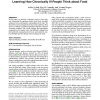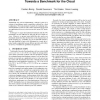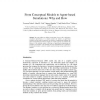26354 search results - page 101 / 5271 » How we refactor, and how we know it |
ICIP
2003
IEEE
14 years 11 months ago
2003
IEEE
Overcomplete transforms, like the Dual-Tree Complex Wavelet Transform, offer more flexible signal representations than critically-sampled transforms, due to their properties of sh...
CHI
2006
ACM
14 years 10 months ago
2006
ACM
In this paper, we describe a formative study to learn how one chronically ill population thinks about food, mentally organizes food, and interprets consumption-level icons. We fou...
SIGMOD
2009
ACM
14 years 10 months ago
2009
ACM
Traditionally, the goal of benchmarking a software system is to evaluate its performance under a particular workload for a fixed configuration. The most prominent examples for eva...
PODS
2002
ACM
14 years 10 months ago
2002
ACM
Decision support system users typically submit batches of range-sum queries simultaneously rather than issuing individual, unrelated queries. We propose a wavelet based technique ...
AIED
2009
Springer
14 years 4 months ago
2009
Springer
The core problem we address in this paper is how to take a declarative conceptual representation of a complex system and produce an agent-based simulation of that model. In particu...



